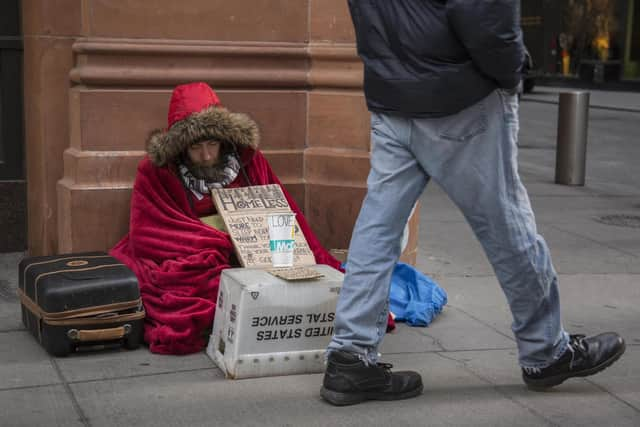BillyChips: A new and effective way of helping the homeless - Bird Lovegod
In my experience people street begging are usually not rough sleeping - some are, but not most.
They are frequently in hostels, or sofa surfing, or living in some other insecure kind of accommodation. They might have a roof over their heads, but it’s certainly not home.
Advertisement
Hide AdAdvertisement
Hide AdAlso, in my experience, they usually have drug addictions. This is both a contributory factor to their situation, and an obstacle to elevation out of it. It also makes giving them money problematic.


Does it help to give money?
It’s an ethical dilemma, and for me, there’s no one single answer. In some instances yes, in others, no. But if you harden your heart against them in the belief they will ‘only spend it on drugs’ then it’s very easy to feel self righteous without having actually done anything to help, not even spoken to them, or said a prayer for them, or taken any other action.
So it risks becoming an excuse to justify one's own lack of care whilst protecting one's own conscience. A person begging on the street is an ethical and moral challenge to everyone individually and all of us collectively.
It’s rare to see a meaningful system to address this conundrum.
Advertisement
Hide AdAdvertisement
Hide AdThe Big Issue magazine was one such, having the effect of giving the homeless a means to earn money honestly and legitimately, whilst raising themselves in every way and raising awareness of the issue of homelessness in the doing so.
There’s another very credible way to support homeless people emerging that evades the ethics and practicality of giving cash.
It’s called Billy Chip, you might have already heard about it on TV. The chip itself looks like a casino chip, people can buy them from participating shops and cafes for £2. The chip can then be given to homeless people and they can redeem it in any of the participating shops and cafes in exchange for hot drinks, and perhaps food.
At the end of the month the shop is invoiced by BillyChip for the £2 each chip sold for minus £1 for each chip redeemed via a simple online platform. Some brands have already got on board, Greggs being one, and the Co-op are soon to do the same, and many dozens of independents.
Advertisement
Hide AdAdvertisement
Hide AdSmall local independents are also very welcomed, and in some way that’s socially preferable. It’s easy, and free for businesses to become a BillyChip outlet, the welcome pack contains 25 chips, plus window stickers, and leaflets, and I for one will buy five the first time I see them.
It’s kind of a currency for homeless people, a tokenisation of kindness, and a true way to give kindly to homeless people without the ethical and moral dilemma of potentially funding harmful behaviour.
The story of the creation of BillyChip is also one of love. The idea came from Billy Abernethy-Hope, a 20 year old ambulance driver, who shared the idea with friends and family before a trip to Thailand in 2018, where he was tragically killed in a motorcycle accident.
The idea was brought to life in his name, and is run as a not for profit social enterprise by his friends and family. A very beautiful legacy.
Advertisement
Hide AdAdvertisement
Hide AdIf you ever see BillyChips, I do urge you to buy some and give them. And if you’re a business owner, please do become an outlet for them and add to the success of this extraordinary and rather wonderful movement of giving and care.
Bird Lovegod is MD of EthicalMuch